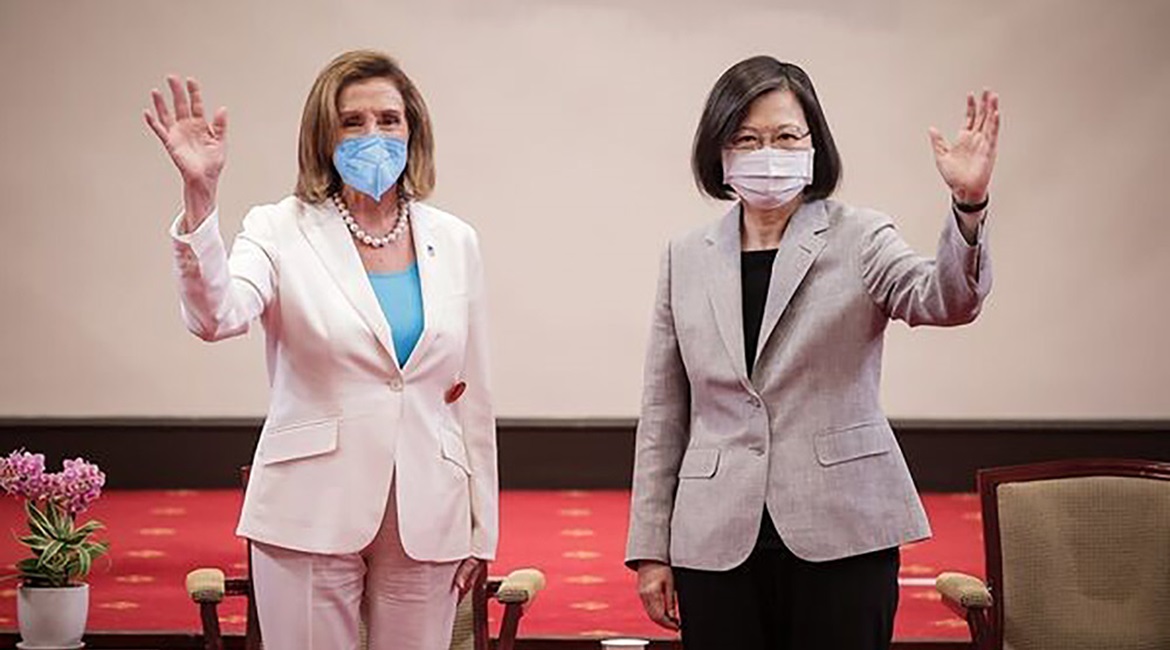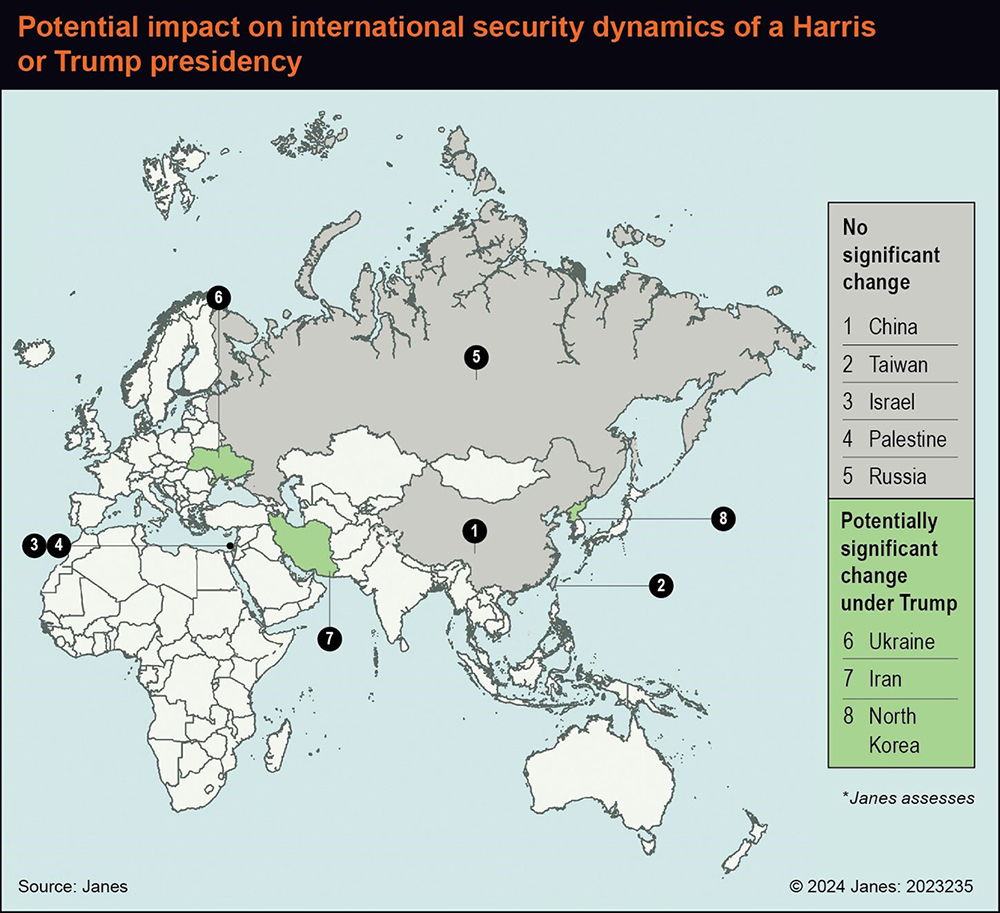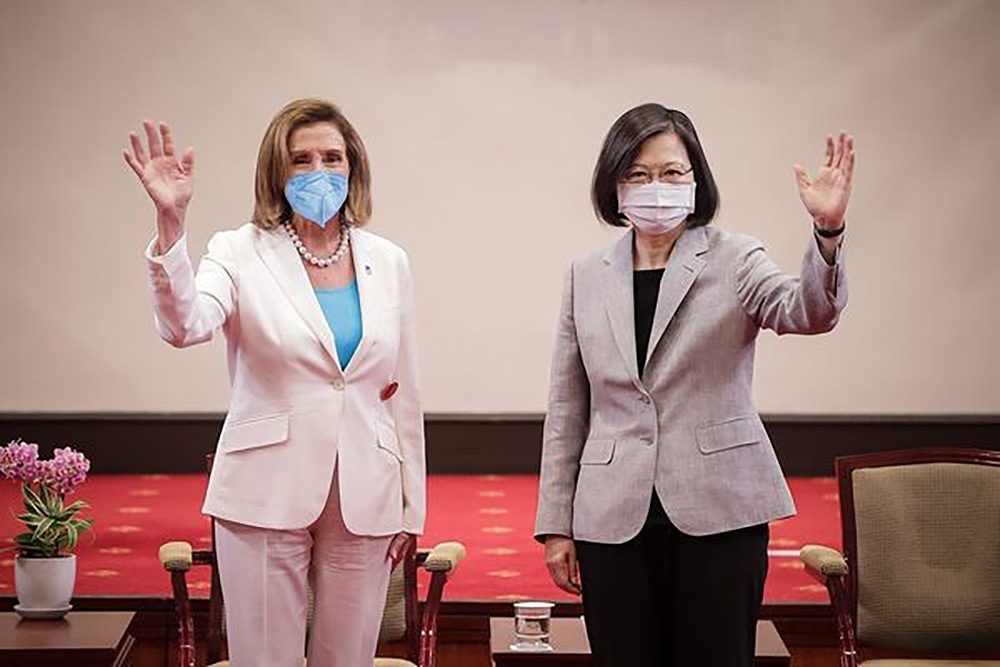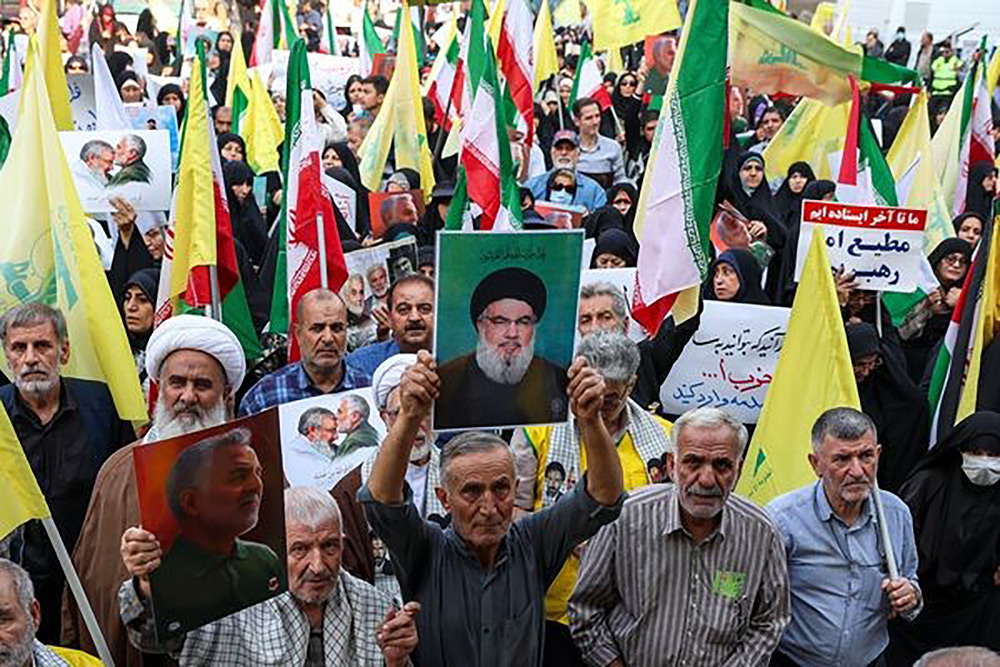
Date Posted: 18-Oct-2024
Author: Lewis Galvin, London, UK Alex Petric, London, UK Saurav Sarkar, Bangalore, India, Anant Venkatesh, Bangalore, India
The 5 November 2024 United States presidential election will introduce a new administration with new foreign policy ideas. Janes Senior Americas Analyst Lewis Galvin analyses the potential impact on security dynamics in Asia, Europe, and the Middle East, with contributions from analysts Alex Petric, Anant Venkatesh, Elliot Chapman, and Saurav Sarkar
Key points
- Intelligence question: What implications will the 2024 United States presidential election have on international security? Will the security dynamics in the Asia-Pacific, European, and Middle Eastern theatres undergo a substantial shift depending on whether Kamala Harris or Donald Trump wins the presidency?
- Significance: Harris has indicated she will likely pursue foreign policy with a substantive degree of continuity from incumbent President Joe Biden, entailing a greater likelihood of less impact on regional security dynamics, positive or negative. This includes continuing to support Israel, Taiwan, and Ukraine militarily, while economically challenging adversaries such as China and Iran. Trump is more likely to demand further economic concessions from allies, particularly over military co-operation agreements with partners such as Taiwan, South Korea, and Ukraine. In the Middle East, Trump will very likely continue supporting Israel's right to defend itself while repursuing his ‘maximum pressure' strategy on Iran by targeting broad swathes of the Iranian economy with sanctions and attempting to inhibit the Iranian government's ability to support regional proxy groups
- Assessment and outlook: Janes assesses that a Trump administration would likely lead to significant changes in the security dynamics in Iran, North Korea, and Ukraine. Trump's ‘maximum pressure' policy would very likely inhibit the Iranian economy, and in turn limit the Iranian government's ability to support regional proxies, such as Hamas and Hizbullah, in the medium to long term. Regarding North Korea, Trump's previous administration demonstrated a willingness to negotiate with the North Korean government, although North Korea's increasing co-operation with Russia to circumvent economic and military sanctions will very likely make it more difficult to engage in negotiations in the short term. The prospect of Trump reducing economic and military aid for Ukraine similarly poses an increased risk of prompting the Ukrainian government to enter negotiations to find a resolution to the conflict. Contrarily, Harris' policies are unlikely to significantly change the assessed security dynamics if the global security landscape continues on its current trend.
Intelligence requirement
The 5 November 2024 US presidential election comprises Democratic Party ticket of current Vice-President Kamala Harris and Minnesota Governor Tim Walz, and Republican Party ticket of former President Donald Trump and Ohio Senator JD Vance. The winning candidate will replace incumbent President Joe Biden of the Democratic Party on 20 January 2025.
The change in administration will almost certainly affect US foreign policy, particularly related to the Asia-Pacific, European, and Middle Eastern theatres. However, the two candidates are assessed by Janes as highly likely to have differing impacts on different security dynamics in the regions. The countries and territories assessed in this regard are derived from threats identified in the 2017 and 2022 national security strategies published under the administrations of Trump and Biden respectively, in addition to prominent ongoing conflicts, namely:
- China and Taiwan
- Iran
- Israel and Palestine
- North Korea
- Russia and Ukraine
Context
The 2016–20 Trump administration's foreign policy was underpinned by the ‘America First' doctrine, which prioritised domestic prosperity and security over overseas commitments. The preamble to the 2024 Republican Party manifesto on Trump's campaign website is “America First: A Return to Common Sense”, indicating that the 'America First' doctrine will almost certainly continue to be the cornerstone of a Trump administration's foreign policy. Trump's campaign website refers to his 2024 manifesto as ‘Agenda 47', referencing that if victorious Trump would be the 47th US president in history, which is separate from the Project 2025 agenda frequently cited in mainstream media. During the 2024 campaigning period Trump has indicated that his foreign policy will shift to become more transactional compared with 2016–20. Trump has called on Taiwan to pay for US military support, and suggested US military support for Ukraine should be loaned rather than donated.
Meanwhile Harris is very likely to retain a similar foreign policy to Biden's 2020–24 administration. She reaffirmed her commitment to militarily supporting Israel and Ukraine at the Democratic National Convention (DNC) from 19 to 22 August, and for ensuring Taiwan's ability to defend itself during a speech on 7 October. The 2022 National Security Strategy (NSS) referred to China as an autocracy while acknowledging its position as an economic competitor, and in the 7 October speech she called Iran the US' “greatest adversary”.

Potential impact on international security dynamics of a Kamala Harris or Donald Trump presidency. (Janes)
Significance
China and Taiwan
High-level bilateral dialogue mechanisms between the US and China have gradually resumed since a 2023 summit between Biden and Chinese President Xi Jinping.
Relations between the US and Taiwan remained consistent under the Biden administration, with the continuation of arms sales and military training, and the US' commitment to the one-China policy.
Harris
Harris has not explicitly outlined her policy regarding China, but in an interview with US media outlet CBS News in 2023 she emphasised the need to “maintain open lines of communication to responsibly manage the competition between [China and the US]”. On Taiwan, Harris supports the one-China policy and ‘strategic ambiguity', as well as Taiwan's ability to defend itself.
Janes assesses with moderate confidence that Harris would likely seek to strengthen key relationships with regional partners, such as Australia, Japan, and South Korea, to counteract perceived Chinese aggression in the Taiwan Strait and South China Sea. Increasing military co-operation in the region, particularly through direct US deployments and exercises, will very likely increase the risk of accidental confrontation with Chinese military assets. However, Harris' insistence on maintaining the lines of communication with the Chinese government makes it unlikely that any accidental confrontation would significantly impact US-Chinese relations or the region's security landscape.
Harris' support for Taiwan's ability to defend itself indicates that her administration would continue to provide military assistance to the Taiwanese government, likely through equipment donations, such as fighter aircraft or anti-air/ship missiles. This would likely increase the risk of China conducting large-scale military exercises near Taiwan in response. Janes is highly confident that US assistance for Taiwan is very unlikely to deter China's aggressive actions in the Taiwan Strait due to the latter's advantageous military capabilities in the region. Similarly, it is very likely that China will conduct military exercises or increase its presence in Taiwanese air and maritime space if there is high-level engagement between Taiwanese and US officials, similar to when then-US House of Representatives Speaker Nancy Pelosi visited Taipei in 2022. High-level visits between Taiwanese and US officials are viewed as unfavourable by China, as they are perceived to undermine the one-China policy and are therefore very likely to be interpreted by Beijing as threats to China's national sovereignty.
Trump
Trump's manifesto, referred to as Agenda 47, indicates that Trump's foreign policy regarding China is very likely to be driven by economic factors, such as revoking China's most favoured nation status and increasing tariffs on imports. Similar to Harris, he is very likely to persist with the US' ‘strategic ambiguity' policy regarding Taiwan, thereby recognising the one-China policy while maintaining unofficial ties with Taiwan.
Trump's campaign has focused on the US' economic relationship with China, indicating that US-Chinese relations are unlikely to be dictated by security policy. At a campaign rally in September 2024, Trump pledged to increase tariffs on Chinese exports up to 60% and to impose restrictions on critical industries such as energy, telecommunications, and technology.
Trump likened US military support for Taiwan to an “insurance policy” during the campaigning period, although Janes assesses with moderate confidence that he is likely to continue supporting Taiwan in exchange for economic concessions from the Taiwanese government. As president, Trump demonstrated his commitment to supporting Taiwan by increasing US military activity in the Taiwan Strait while simultaneously taking a tough economic stance on China. However, Janes assesses with moderate confidence that Trump's isolationist rhetoric and scepticism of US alliances and partnerships are likely to increase concerns in Taiwan, and increase the prospect of the Taiwanese government supplementing its military requirements through alternative partners while increasing investment in its armed forces.

Then-Speaker of the US House Of Representatives Nancy Pelosi and Taiwan's then-President Tsai Ing-wen at the president's office in Taipei, Taiwan, on 3 August 2022 (Office of the President via Getty Images/Chien Chih-Hung)
Iran
During 2016–20 Trump pursued a policy of ‘maximum pressure' towards Iran, which included the targeted assassinations of high-ranking officials such as the then-Commander of the Islamic Revolution Guard Corps-Quds Force (IRGC-QF), Major General Qasem Soleimani, in January 2020. According to the 3 March 2021 Iran Primer by the United States Institute of Peace (a non-profit organisation), Trump imposed more than 1,500 sanctions on Iran, including individuals and foreign entities with business dealings in Iran from a further 21 countries, and on Iran's oil and gas industry. In 2018 Trump withdrew the US from the Joint Comprehensive Plan of Action (JCPOA), which restricted Iran's nuclear development programme in exchange for sanctions relief.
For more information on Iran's nuclear status, please see Iran nuclear primer: Q4 2024 .
Biden similarly prioritised implementing sanctions on over 600 individuals and entities to pressure Iran economically, but expressed interest in renewing the JCPOA in 2022. Talks stalled in mid-2022, though, and have not resumed at the time of publication.
In July Iran elected reformist candidate Masoud Pezeshkian as president, who said in the same month that he wished “to emphasise that Iran's defence doctrine does not include nuclear weapons and urge the United States to learn from past miscalculations and adjust its policy accordingly”.
Iran's ongoing financial and material support for a regional network of non-state armed groups (NSAGs) in the Middle East, including Ansar Allah (commonly known as the Houthis), Hamas, Hizbullah, and various Iraqi and Syrian Shia militia groups – the self-described ‘Axis of Resistance' – very likely disrupted any prospective US-Iran negotiations under Biden, particularly after Hamas' attack on Israel on 7 October 2023 and Iran's retaliatory unmanned aerial vehicle (UAV) and missile attacks targeting Israel in April and October 2024.

Iranians lift the flag of Hizbullah and a portrait of its slain leader Hassan Nasrallah during an anti-Israel rally in Tehran on 8 October 2024. (AFP via Getty Images)
Harris
Harris has referred to Iran as a destabilising force in the Middle East. However, her policies are likely to align with the Biden administration's and be more defensive or reactionary than proactive. Harris criticised the previous Trump administration's decision to assassinate high-profile Iranians.
In a 3 January 2020 post on X (formerly Twitter) Harris said, “Soleimani was an enemy of the US, but President Trump's actions put more American lives at risk and could lead to a new war in the Middle East,” indicating that she is very unlikely to pursue a similar, aggressive strategy to curb Iran's regional influence. However, Janes assesses that this strategy is subject to several variables including Iran's continued support for the ‘Axis of Resistance', the Iranian government's amenability to negotiations over the JCPOA and the application of International Atomic Energy Agency (IAEA) safeguards, and the risk of direct conflict between Iran and Israel stemming from the 7 October 2023 Hamas attacks.
At the time of publication, Harris had not indicated that she would implement a different policy towards Iran than the Biden administration. Therefore Janes assesses with moderate confidence that Harris will likely replicate Biden's foreign policy strategy regarding Iran. This assessment is based on the assumption that the security landscape continues along a similar trajectory as in mid-October 2024. This strategy includes attempting to revive the JCPOA, although this will very likely be contingent on Iran's support for the ‘Axis of Resistance' and any retaliation to Israel's ongoing military operations in the Middle East. Israel's war with Iranian-backed groups in the Gaza Strip, Iraq, Lebanon, Syria, and Yemen has likely reduced Harris' willingness to renegotiate the JCPOA in favour of giving Iran economic concessions in the short to medium term, as this risks being perceived as enabling Iran to continue funding the ‘Axis of Resistance'.
Trump
During the campaigning period Trump frequently accused the Biden administration of enabling Iran to fund regional proxy groups by intermittently suspending sanctions. Trump's emphasis on Iran's financial strength suggests he would likely renew sanctions to target the Iranian economy and to attempt to inhibit Iran's ability to support regional NSAGs. Trump has ruled out renewing the JCPOA.
Janes assesses with high confidence that Trump would almost certainly refuse to renegotiate the JCPOA, and would instead likely repursue a similar policy of ‘maximum pressure' as he did during 2016–20. Throughout the campaigning period, Trump has consistently referred to Iran's ability to financially support the ‘Axis of Resistance', therefore increasing the likelihood that his administration would expand economic sanctions on the Iranian government.
Trump is viewed negatively in Iranian state media and by conservative-inclined Iranians, such as Supreme Leader Ayatollah Ali Khamenei, after authorising Soleimani's assassination. Consequently, Janes assesses with moderate confidence that Iran is likely to intensify its support for the ‘Axis of Resistance' as Israel conducts military operations targeting Iranian-aligned groups, and implement hard-line foreign policy initiatives that risk fragmenting the relationship between Khamenei and Pezeshkian. Janes assesses that there would be a roughly even chance that this shift in foreign policy would increase the prospect of Iran's national security being impacted by covert operations, particularly from Israeli security forces, while Israel is violently engaged with the ‘Axis of Resistance' on multiple fronts because of the risk Israel perceives to its security from further Iranian attacks.
For more information, please see US presidential election outcome risks affecting security dynamics in Asia, Europe, and the Middle East






